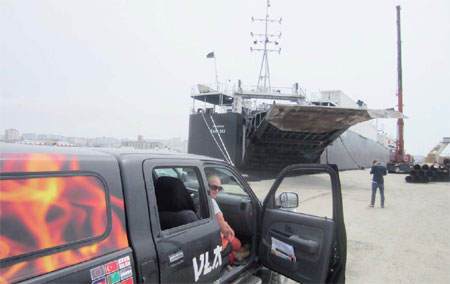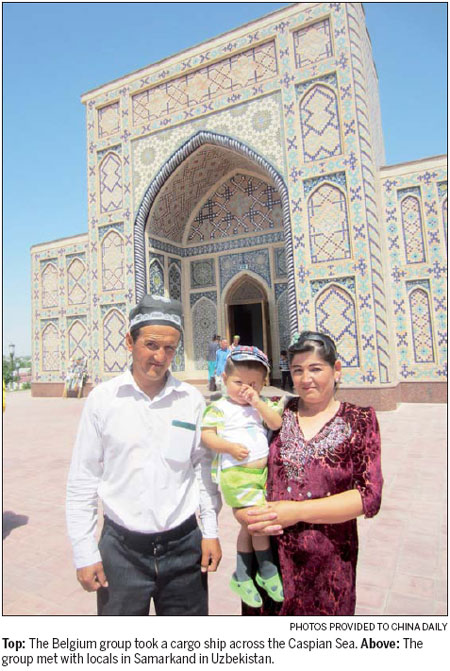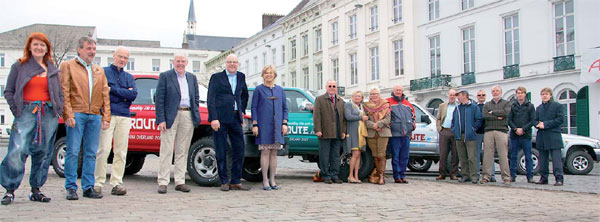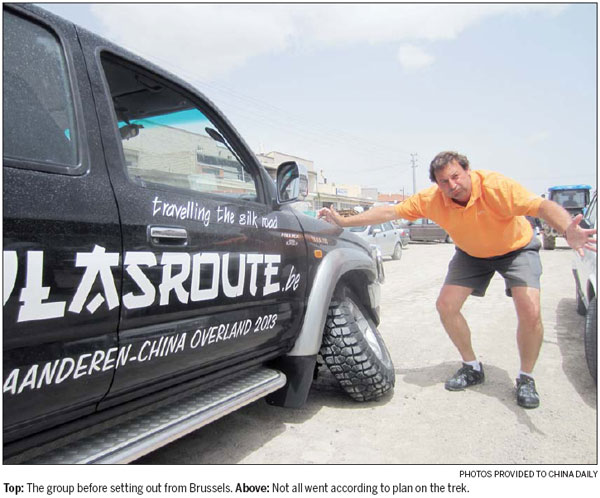Linen dreams on the Silk Road

A group of belgian businesspeople recreate the steps of their forefathers and return richer for the experience
It may not be the yellow brick road but, like Dorothy in the much-loved fictional story it appears in, the old Silk Road has got businesspeople in Belgium and China dreaming.
They are hoping that the route once trodden by Flemish linen traders can again help promote closer economic ties between Asia and Europe.
A group of Belgian businessmen and women have just returned from the trip of a lifetime in which they retraced the steps once taken by flax and linen traders from the Low Countries.
Traveling by road from Harelbeke and Mechelen, just north of Brussels, they journeyed to Chengdu in China's Sichuan province and then to Suzhou, roughly 20,000 kilometers. The 18-strong group was not taking flax in return for silks and spices, though.
The marathon trek through Central Asia was the idea of Dirk Vyncke, chairman of a Flemish company selling energy installations.
"This was not a trade mission," he says. "Nor were we tourists or adventurers. We went to listen to people and exchange ideas on how we can prepare a better future for our children and grandchildren. The world is, more than ever, a global village where we all are interconnected and dependent on each other."
Vyncke believes we have to find a "better system" for global trade and relations and "the answer cannot be found in books. It is time for responsible global citizens everywhere to listen respectfully to each other, to learn from each other and to think up new solutions."
That was also one of the aims of flax traders who set off from Belgium along the old Silk Road hundreds of years ago. For centuries, flax had been grown and transformed into linen fabrics throughout Flanders. But by the 1850s there was a reversal of fortune for the industry, and the sector continued to wane throughout the 20th century.
However, plans for a Silk Road "economic belt", proposed by China, have revived hopes that this ancient trading route can once again be a source of new economic strength - both within China and between Asia and Europe.
President Xi Jinping recently repeated his desire to create a Silk Road economic belt, after he visited Kazakhstan, where he proposed the idea as a way for European and Asian nations to promote closer economic ties.
As well as the international strategic significance, creating a Silk Road belt would help economic development in western China and have a far-reaching impact on regional development in general.
The aim is to recreate the prosperous era that existed during the time of the ancient Silk Road.
This is what partly inspired Vyncke and his colleagues when they set off in seven SUVs on their own Silk Road adventure in May, seen off by Flemish Minister-President Kris Peeters. Their trip was closely followed by the Belgian media, including the weekly English language newspaper Flanders Today.
After taking a cargo ship across the Caspian Sea and trekking though the deserts of Central Asia, they completed the first leg of the trip at Almaty in Kazakhstan in late June.
They returned briefly to Belgium to avoid the blistering Central Asian summer and then set off again in October to complete the journey to China.
The second leg took the travelers along the same route designated in the Chinese government's New Silk Road policy, which aims to open up ancient commercial routes to new forms of trade with Central Asia, and included Turkey, Georgia and Azerbaijan.
Their destination was Chengdu, where the company owned by Bob Elsen, 66, another member of the team, recently opened a travel cafe.
As Vyncke notes, trade in cities dotted along the Silk Road flourished as long as the military closely monitored the movement of people and goods. This was particularly so during the Han dynasty (206 BC-AD 220) and the Tang dynasty (AD 618-907). Without such surveillance, trade did not survive.
The group's six-month adventure coincided with a major rebuilding project along the ancient trade routes, in which China has ploughed huge investment into infrastructure projects, including road networks, electricity grids, high-speed trains, oil and gas pipelines, and other commercial ventures.
Chengdu is the hub of the new Southern Silk Road and the Chinese government's policy to strengthen trade relations with Myanmar, Bangladesh and India.
For most Europeans, this is a part of the world that is virtually unknown, but Vyncke and his colleagues say they returned to Belgium "very much enriched" by the experience.
Elsen, managing director of the Mechelen-based travel company Joker, says it was the "magical attraction" of the Silk Road that was the initial attraction.
"It is the route where goods, ideas and even philosophies have been traded since time immemorial as great civilizations rose and fell," he says.

"Putting the idea into practice was not easy. There were wild stories about the Caucasus, Central Asia and western China, but putting those areas under the cultural and economic microscope with a group of business people was a story I wasn't going to miss."
For fellow traveller Lutgart Dusar, 63, it was a question of "now or never".
She found the Silk Road to be "a stretch of shifting, unmarked paths across massive expanses of deserts and mountains - not a real road at any point or time."
"The main defining features are best seen from the air," she adds. "Converging valleys, desert oases and river chasms among towering mountain peaks."
Silk, she points out, was not the only product traded on such routes, saying paper had a "far greater impact on human history".
Educational standards in the region remain relatively low but she believes its natural resources and cheap labor can help revive the halcyon days of the Silk Road.
The team, which maintained a regular blog during the epic trip, also included Steven Harmans, who is in his early 30s.
"The trip definitely offered some new insights," he says. "I expected a population terrified of speaking to foreigners but found openness and hospitality everywhere we went."
Vyncke came up with the idea when his company Vyncke Energy Technology celebrated its 100th anniversary.
"Our business had been forced to set off into the wide world, just as the flax farmers had to transform into industrialists," he says. "That gave me the idea of the link, of setting off in a jeep from Harelbeke to our factory in Suzhou on China's east coast."
The trip cost 100 to 300 euros a day per person, covering everything from basic food and tents or guesthouse to fancy food and five-star hotels.
"The toughest border to pass was Turkmenistan, a special country altogether," Vyncke says. All the top moments were with local people but nature and culture were also fantastic all the way.
"We wanted to come into contact with our peers so we could listen to what they had to say. Language is still a barrier in Central Asia and China, but that's changing fast, and a good guide can make all the difference.
"To really succeed in global business you have to first listen with an open mind, respect the other and make friends. As the Chinese say: first friendship, then business.
"Doing what we did gives you the chance to exchange ideas and convictions. That is just as important."
For China Daily




(China Daily European Weekly 12/06/2013 page24)
Today's Top News
- Chinese, Russian media outlets urged to enhance cooperation
- Where mobility will drive China and the West
- HK community strongly supports Lai's conviction
- Japan paying high price for PM's rhetoric
- Japan's move to mislead public firmly opposed
- Xi hails progress in Hong Kong, Macao






























